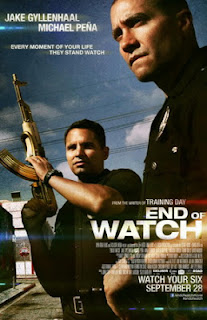End of Watch
End of Watch is a well done crime film that is a tribute to the sacrifice that cops make. Though overly sensational--even in South Central L.A., I doubt cops get in that many shootouts--it still grabbed me.
The focus is on two patrolmen, Jake Gyllenhaal and Michael Pena. At the beginning of the film they shoot two perps, but it seems to hardly affect them. They are gung-ho about their work--idealistic to a fault, maybe--and devoted to each other. As another cop says later on, cops patrolling this neighborhood are like soldiers.
The neighborhood is at war, with the Mexican and black gangs struggling for control of the drug trade. Our two heroes start uncovering some larger activity, which a federal agent tells them is a cartel. During a routine welfare check they find a gruesome discovery, which the fed likens to pulling on a snake's tail.
The film was written and directed by David Ayer, and it's clear that he was not interested in police corruption or racial profiling or any other criticism of policemen. Cops in this film are heroes, pure and simple, although Gyllenhaal asks at one point, "What does being a hero feel like?" The brotherhood of the cops, especially exemplified by Pena's toast at Gyllenhaal's wedding (to Anna Kendrick) sums it all up, when he says that Kendrick is now part of his family.
Occasionally the film drifts into Hallmark territory, especially with Pena's family, an idealized Mexican brood, but I admired the film's integrity and ring of authenticity. The acting is uniformly good, especially Pena, as the guy from the barrio who gets out of the gang life. Also in the film is an unrecognizable America Ferrera as another cop.
The focus is on two patrolmen, Jake Gyllenhaal and Michael Pena. At the beginning of the film they shoot two perps, but it seems to hardly affect them. They are gung-ho about their work--idealistic to a fault, maybe--and devoted to each other. As another cop says later on, cops patrolling this neighborhood are like soldiers.
The neighborhood is at war, with the Mexican and black gangs struggling for control of the drug trade. Our two heroes start uncovering some larger activity, which a federal agent tells them is a cartel. During a routine welfare check they find a gruesome discovery, which the fed likens to pulling on a snake's tail.
The film was written and directed by David Ayer, and it's clear that he was not interested in police corruption or racial profiling or any other criticism of policemen. Cops in this film are heroes, pure and simple, although Gyllenhaal asks at one point, "What does being a hero feel like?" The brotherhood of the cops, especially exemplified by Pena's toast at Gyllenhaal's wedding (to Anna Kendrick) sums it all up, when he says that Kendrick is now part of his family.
Occasionally the film drifts into Hallmark territory, especially with Pena's family, an idealized Mexican brood, but I admired the film's integrity and ring of authenticity. The acting is uniformly good, especially Pena, as the guy from the barrio who gets out of the gang life. Also in the film is an unrecognizable America Ferrera as another cop.



Comments
Post a Comment